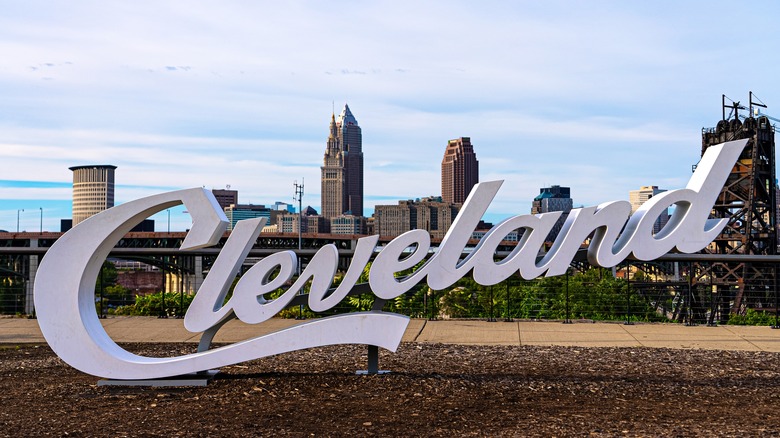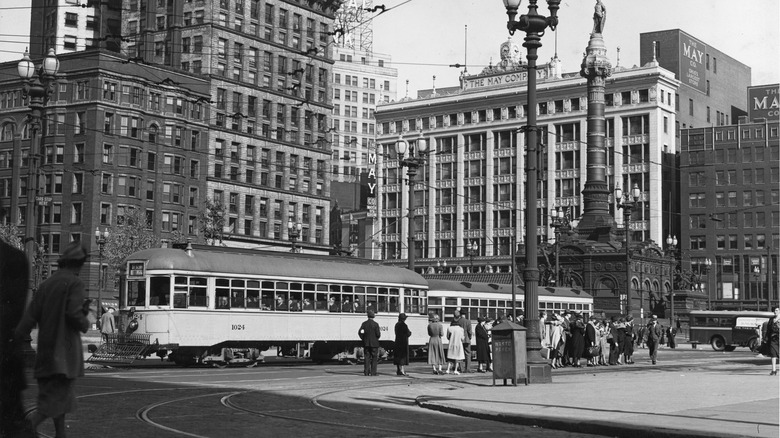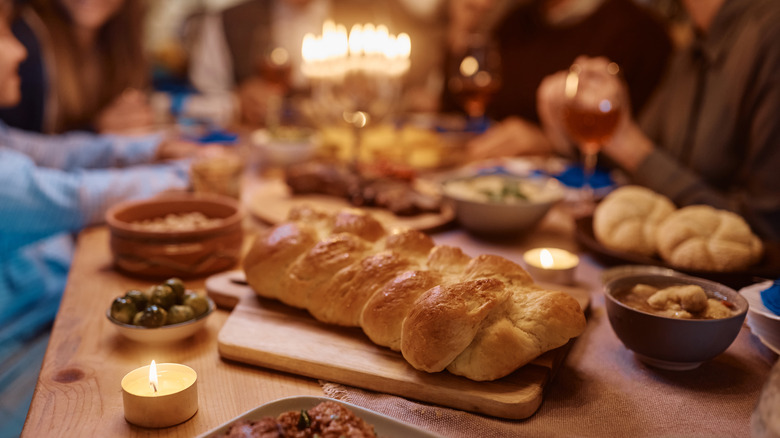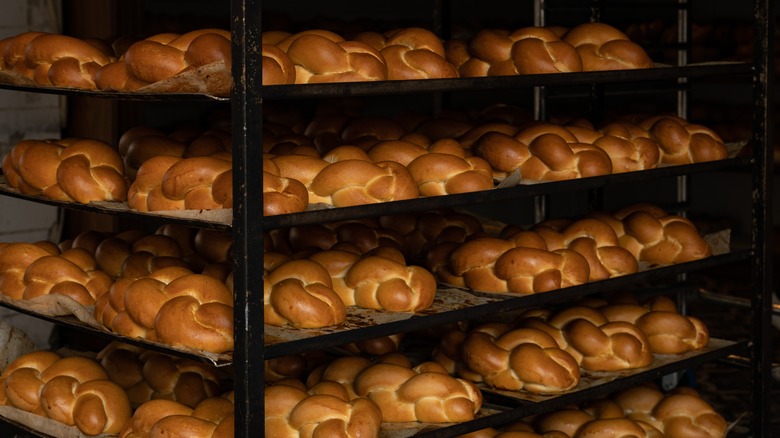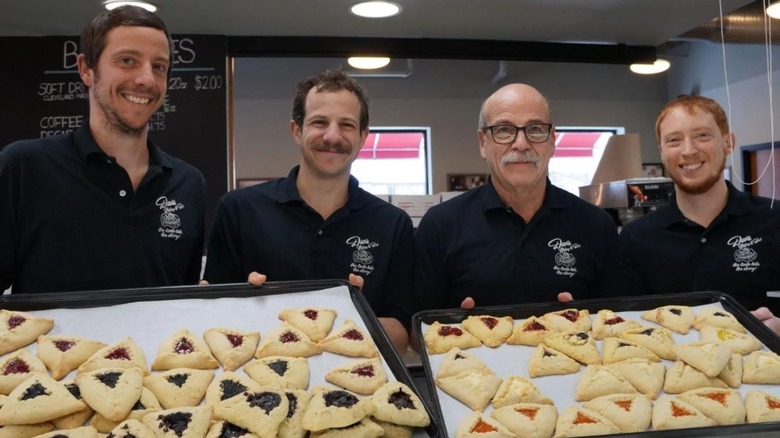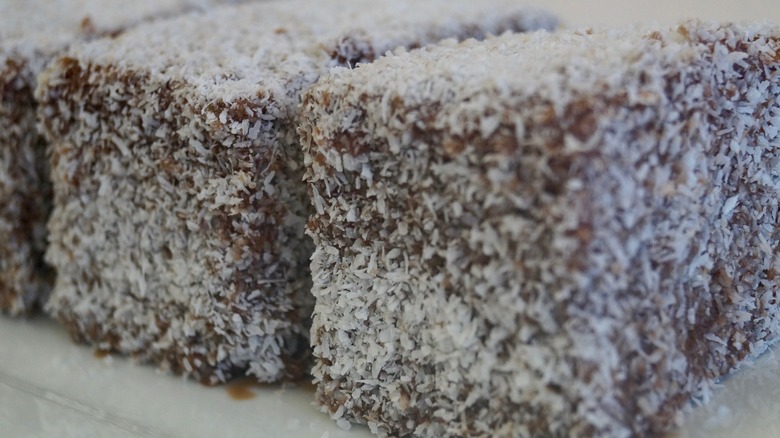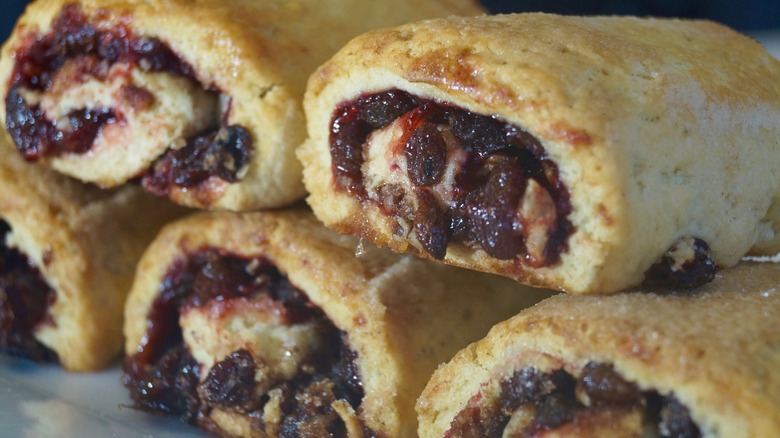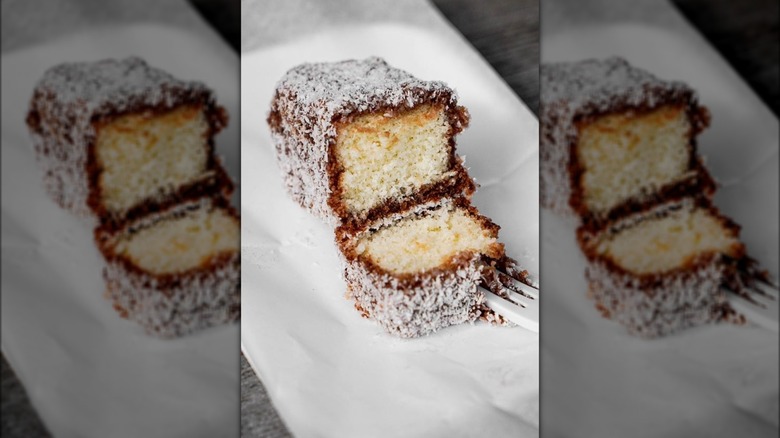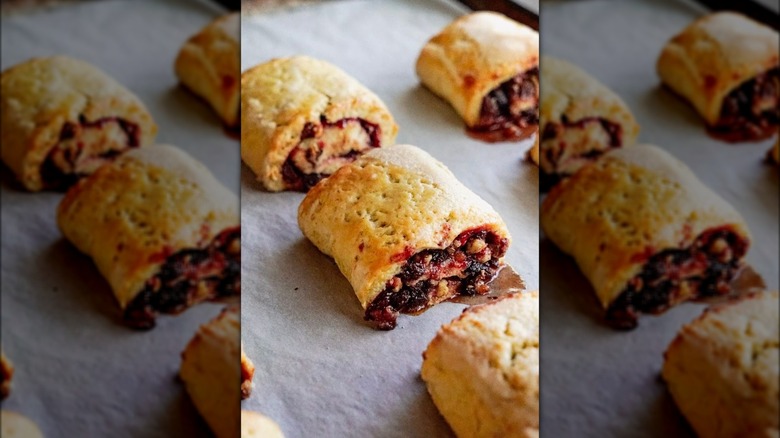Cleveland Is Home To Two Beloved Jewish Pastries You Didn't Know You Needed
After far too many years of misrepresentation, Cleveland's once-poor reputation has thankfully become a thing of the past. The city is now getting praise for its arts and theater districts, cutting-edge medical facilities and research, and rich and diverse food scene. For those looking for your next food-centered vacation, a long weekend in Cleveland should be on your radar. Just maybe wait until the winter's snow has finally melted.
Cleveland's food scene has been up and coming for years. The revitalization of AsiaTown, Van Aken shopping center, Tremont, and Hingetown, not to mention the century-old West Side Market, has made it the perfect landing spot for hungry visitors. Alongside the new and revitalized, Cleveland's food scene also benefits from some of the city's older traditions, many of which stem from the diverse communities that now call the city home. This includes two of the city's unique pastries, born out of its active Ashkenazic Jewish community: Russian tea biscuits and coconut bars.
I not only enjoyed both of these delicious pastries while growing up in Cleveland's Jewish community, but also interviewed Jay Davis, a third-generation owner of Davis Bakery, and Larder Bakery & Delicatessen chef Jeremy Umansky to learn more about the rich history and tradition of each. For those with a sweet tooth, set your sites on C-town and two of its beloved Jewish pastries you didn't know you needed until now.
Cleveland's Jewish population dates back to the 1800s
The city of Cleveland is known for its substantial Ashkenazic Jewish communities, which comprise a piece of the city's diverse landscape of cultures, cuisines, and traditions. Much of this diaspora can be traced back to the mid-1800s, when approximately 15 people from the Jewish community of Unsleben, Bavaria in Germany immigrated to Cleveland in 1839. From there, the population grew as rapidly as the developing institutions and resources built to support daily Jewish life, from Jewish day schools and religious schools to synagogues and businesses.
By 1920, the Jewish diaspora in Cleveland was over 80,000 deep, ranging in levels of religiousness and with a few central locations where Jewish immigrants had settled, mainly on the city's east side. Some of the first well-known Jewish areas were more central city neighborhoods, such as Woodland near East 55th Street, Glenville, and Mount Pleasant-Kinsman. Eventually, the Jewish communities moved further east and into nearby suburbs, including Cleveland Heights, University Heights, and Shaker Heights, in the 1930s and '40s — which still have a sizeable Jewish influence these days, even as much of the Jewish community continued to move east.
Today, the Jewish population remains at around 80,000, largely on the city's East Side, with many institutions remaining to support various aspects of Jewish life.
Growing Jewish communities needed a taste of home
Diasporas living in any community or culture can be complex, with needs ranging from schooling and places of worship to language integration and access to familiar cultural traditions. Culturally specific music, gatherings and holiday celebrations, and familiar-tasting foods — including foods that can be eaten in accordance with any religious dietary practices — help bring communities from a diaspora together. These events or access to cultural touchstones can boost morale, as well as provide meaning for communities that have resettled elsewhere. For many within the Jewish diaspora, this includes kosher butchers, delicatessens, and bakeries.
Many Jewish people practice the celebration of Shabbat, a weekly holiday that begins Friday evening at sunset and lasts until Saturday evening at sunset. This weekly celebration often commences with the lighting of the sabbath candles and blessings over a glass of wine and a braided yeasted bread known as a challah. Alongside the growing Jewish communities from Eastern Europe, so too was a need for businesses that sold the necessary ingredients for a taste of home. These businesses had a secondary financial benefit, required to help sustain the Jewish community, individual families within the diaspora, and the greater community at large.
Jewish bakeries began opening near Jewish communities
By the mid-1920s, as the Jewish diaspora began moving and settling east of downtown Cleveland, retail shops were already beginning to open along the commercial area of Cleveland Heights known as Coventry, many of which remained until the 1960s. Shops like Uberstine Heights Drug Co., Bruder's Creamery Stores, Coventry Poultry Market, and Schaffer's Quality Fruit Market were opened. Eventually, these shops were replaced some years later by Hunan on Coventry, Record Revolution, and others as the neighborhood's demographics changed.
Like butchers and kosher markets, Jewish bakeries were also on the rise. Sherwin's Bakery was opened in 1920 by Abraham Cherwinsky and his wife, Katie. It became known for selling Jewish baked goods, including Russian tea biscuits — a Cleveland original pastry associated with the city's Ashkenazic Jewish communities — at affordable prices during the Great Depression. Years later, in 1939, Davis Bakery opened its first bakery on South Taylor Road in Cleveland Heights. Unger's Kosher Market and Bakery, which first opened in 1918, moved into the Cleveland Heights area in the late 1940s, expanding the business to include a market and a bakery to serve the community's needs. Lax and Mandel Bakery first opened its doors in 1956. It is also located near Davis Bakery on South Taylor Road in Cleveland Heights.
It became clear that Jewish foods from Eastern Europe were weaving their way into the city's wider culture due to their increased prominence within Cleveland's more densely populated Jewish areas.
Davis Bakery is one of the oldest Jewish bakeries still around
It has been documented for years that the Jewish deli of the 1920s, '30s, and '40s has been on the decline for quite some time. This is due to several reasons, from mobility of communities, to lack of family members who want to inherit the business, not to mention changes in tastes and cultural influences, and the rising costs of meat.
Cleveland, despite its unwavering Jewish-identifying population, is no exception to this trend. The city more recently mourned the loss of one of its Jewish deli institutions with the shuttering of Corky & Lenny's Delicatessen in late 2023. Other Jewish-owned institutions that have since closed their doors include most of the bakeries previously mentioned. Davis Bakery and Unger's Kosher Market and Bakery are amongst the survivors, steadfast in their ability to withstand wars, pandemics, and recessions.
Despite the closings of some of the older Jewish institutions, rest assured, Jewish-inspired or -influenced foods aren't going anywhere in Cleveland. Instead, the business model is simply changing and growing along with the needs and wants of the communities. Many businesses now reflect a more comprehensive range of foods from the Jewish diaspora and include more vegetarian options. Businesses like Larder Delicatessen and Bakery and Zhug by chef Doug Katz are only increasing in their popularity and adding more variety to some of the dishes, businesses, and traditions that have been embraced by the city.
Davis Bakery sells two pastries ubiquitous to Cleveland
Despite many of their closures, the influence and legacy of Jewish bakeries of Cleveland yesteryear remain strong in two unique-to-Cleveland pastries that are still sold today. Known to locals as Russian tea biscuits and coconut bars, these two pastries are delicious features of the area that have emerged from the Ashkenazic bakery.
Davis Bakery first began selling Russian tea biscuits after the founding brothers brought their experiences together from other recipes to create a new version of the pastry that's still used today. Meanwhile, the coconut bars were a direct result of co-founder Carl Davis' very first job in a bakery at the tender age of 15. When Carl and his brothers, Julius and Ben Davis, opened the bakery in 1939, Carl — by then, 19 years old — used the same method he learned as a young teen to create the coconut bars.
Notably, Davis Bakery was the first of its kind in the area to add a deli to the business some years later in 1952. On my own early morning visit to the Davis Bakery Woodmere branch in the summer of 2023, the line extended out the doors, reflecting its steadfast popularity amongst locals.
Russian tea biscuits vs rugelach
Russian tea biscuits are similar in many ways to a Jewish pastry known as rugelach. Both require a rolled and folded shortcrust pastry that's been spread with a filling — often fruit- and nut-based, like Davis Bakery's classic raspberry jam with walnuts, raisins, and cinnamon. However, alongside each cookie's Eastern European influence, that is where their similarities end.
For those looking for a small, sweet treat, you should order rugelach. Russian tea biscuits are anything but small; they're probably a good four or five times the size of a standard piece of rugelach. Jay Davis, a third-generation Davis Bakery owner, says, "Our Russian tea biscuit should not be confused with our raspberry rugelach. While our raspberry rugelach is filled with the exact same ingredients as the tea biscuit, the discrepancy is in the dough. Rugelach uses butter and cream cheese in the dough, whereas the Russian teas do not."
However, this is not true of all bakeries. Larder Bakery & Delicatessen, for example, uses Ukrainian cream cheese in its Russian tea biscuits, and cream cheese in its rugelach, chef Jeremy Umansky tells us. The difference in the pastries, by and large, comes down to size and, of course, origins. While you can find rugelach just about anywhere with a good Jewish bakery, Russian tea biscuits are unique to Cleveland.
Coconut bars vs lamingtons
Like Russian tea biscuits, coconut bars are also a unique-to-Cleveland baked treat, often associated with the city's Jewish communities. Unlike Russian tea biscuits, however, coconut bars are sold outside the Jewish bakery. They are, in essence, very similar to lamingtons — but call it a lamington in C-town, and you'll likely wind up empty-handed. (Locals are very partial to the name.)
"The coconut bar is a very labor-intensive item," Jay Davis says of Davis Bakery's process, which first involves making a white or chocolate cake base and chocolate sauce for dipping. Once cooled, the cakes are cut and then hand-dipped into the chocolate sauce before being rolled in shredded coconut. It is a time-consuming affair. Meanwhile, Jeremy Umansky at Larder Bakery & Delicatessen tells us that pastry chef Allie La Valle-Umansky has her own interpretation. She makes the coconut bar cakes with 30% coconut flour and also uses coconut milk in the frosting, intensifying the coconut flavor throughout the bar.
While some lamington recipes contain a layer of cream or jam in the center, Cleveland's coconut bars are often made with solid cake throughout.
Where to buy Russian tea biscuits and coconut bars
Both of these delectable, local-to-Cleveland pastries can be found in various places around the city, many of which are well worth visiting for their vast array of offerings, from pastries to sandwiches and other delicious sundries. Russian tea biscuits are slightly more closely linked with the city's Ashkenazic-based bakeries and delis than coconut bars. Pick up a few different flavors at spots such as Davis Bakery, Larder Bakery & Delicatessen, Unger's Kosher Market and Bakery, Jack's Deli & Restaurant, and Goldie's Donuts & Bakery. Flavors range from the classic raspberry with walnuts, raisins, and cinnamon to poppy seed or chocolate. The folks at Larder also offer innovative flavors such as sweet tea or wild berries, drawing their inspiration from Czarist-related flavors.
Those who love chocolate and coconut should make it their mission to find a good coconut bar to sink their teeth into. Pick one or several up at Davis Bakery, Larder, Jack's Deli & Restaurant, or Corbos Bakery in Cleveland's Little Italy. You can even find coconut bars in the bakery section of some grocery stores like Heinen's.
Whatever you do, you definitely don't want to sleep on these pastries if ever in the area. Not only are they delicious, but they are also steeped in Cleveland's longstanding history, pride, and sense of community.
